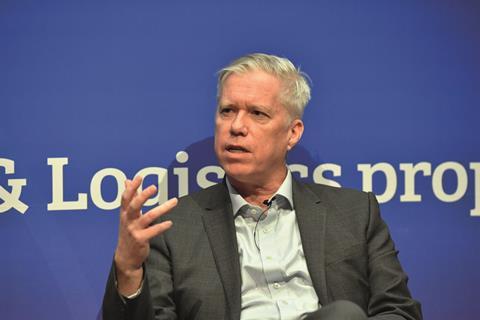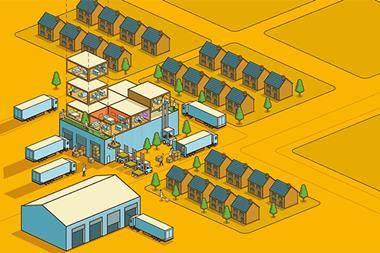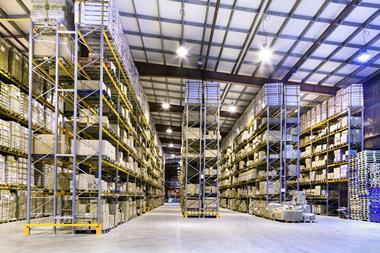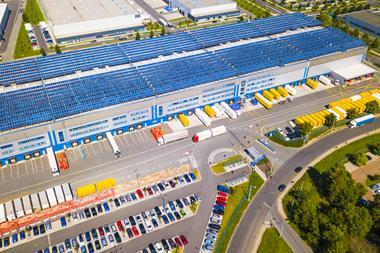The industrial and logistics (I&L) market faces significant challenges over the coming year due to inflation, high interest rates, fluctuating currency markets, supply chain disruptions and geopolitical uncertainty, with more than 60 elections worldwide. But despite all this, demand for logistics space looks set to grow, according to the results of the latest Future Space report.


At Savills and Tritax Symmetry’s Future Space event, a panel of experts set out their reasons to be optimistic for the coming year and discussed how rapidly changing geopolitics and economic issues are refocusing the priorities of occupiers, developers and investors alike.
“We all know what happened over the past three years in terms of occupier demand,” said Kevin Mofid, head of EMEA logistics research at Savills. “But by the end of 2023, take-up had reverted to 29.1m sq ft. That is a drop from the 48m sq ft we saw the previous year, but still 12% above the pre-Covid average.”
A strong end to last year gave hope for the market. In the fourth quarter of 2023, 10.24m sq ft of new leases were signed – the first quarter since 2022 when take-up has been above 10m sq ft. And according to Savills’ annual survey – with a record 340-plus respondents this year – 93% of occupiers said they expected to take the same or more space in the next two years.
Rising costs
When asked what issues were at the top of the priority list, respondents overwhelmingly pointed to the rising cost of energy. Other factors highlighted as key to how the year would play out were economic uncertainty, rising costs of labour and rising costs of raw materials, as well as other operational costs.
On the topic of how rising costs are affecting decision-making, David Ashwell, managing director at AO Logistics, said: “As a retailer, cost is an inevitability and efficiency is always an opportunity. Costs are going to continue to go up for the foreseeable future, and we need to make sure we are leveraging the efficiency of our entire infrastructure in response.
The supply chain implications of what is happening in the Red Sea could be pivotal for many businesses this year
Robert Peston, journalist
“We are planning for growth, but we are not looking to immediately expand our warehousing; we are just looking at how to make it more efficient. Rising costs are a problem, but it centres you to ensure you have your supply chain working well so you can leverage the assets you have got.”
Not only do occupiers face rising operational costs, but rental growth looks set to continue too, especially in areas with constricted supply, according to Jonathan Atherton, head of Savills’ North West I&L team.
“Where I am, the North West, there aren’t enough buildings to satisfy demand,” he said. “As a result, we have seen year-on-year rental growth. As an example, a deal we did in Trafford Park in 2022 was for £7.25/sq ft on a 200,000 sq ft building. A similar building now, less than two years later, is at £10.50.
“The national average is a 4.9% increase over five years; in the North West, it is nearly 6.3%, so it’s going in one direction I’m afraid.”
Changing priorities
With so many extra costs affecting the bottom line, priorities such as environmental, social and governance (ESG), which used to rate higher in Savills’ survey, have fallen down the hierarchy of concerns. As Mofid said: “ESG is less important to many than it used to be, but there is a nuance here. We are asking people what’s concerning them today, and it seems to be all about that bottom line.”
Kate Howe, development director at Tritax Symmetry, added: “We are in a moment where the importance of ESG has taken a back seat and that is normal during such economic circumstances. However, I would categorically say that over the next two to three years it will rank again more highly once we get to a more stable economic position.”
Looking ahead, many said they were keen to explore the potential of automation and robotics to create greater efficiencies in the supply chain. However, those keen to innovate said the major barrier to progress was the power grid.
“From a warehouse point of view, the biggest issue we have is access to power for electrical vehicle charging,” said Saul Resnick, chief executive, UK and Ireland, at DHL Supply Chain.
Cost is an inevitability and efficiency is always an opportunity
David Ashwell, AO Logistics
This sentiment was echoed by the survey, according to Mofid. “Every single year, when we ask developers what the most impactful element is when bringing forward new warehouse schemes, the answer has been the planning system and how long it takes,” he said. “This year, the answer has been power – 68% of all of the substations in the UK do not have enough capacity for a warehouse that is 750,000 sq ft or over.”
Focus on supply chains
One issue that has become paramount in boardrooms across the country following the pandemic is diversification of supply chains. Businesses want to diversify their supplier mix, increase their inventory and shorten supply chains – all to avoid taking as big a hit as they did during the pandemic, when global supply chains slowed to a crawl. However, while Covid may have brought the issue to the forefront, new global developments are keeping it there.
Keynote speaker Robert Peston warned that from drought in the Panama Canal to the Houthis’ attacks in the Red Sea and Gulf of Aden, global supply chains are facing severe instability that is likely to reflect back on to businesses operating in the UK.
“The Middle East is incredibly unstable at the moment, and the supply chain implications of what is happening in the Red Sea could be pivotal for many businesses this year,” he said. “The Houthis’ drone campaign to shut down shipping will likely lead to cost inflation, maybe another 1 percentage point or more. The question remains over whether there is contagion. If the attacks spread from the Red Sea to the Strait of Hormuz, where close to 40% to 50% of all petroleum oil is shipped, that would have a much more significant economic impact on everyone.
“This is the biggest issue facing business this year, and the route to stability, to protect businesses, is a solution to the conflict in Israel and Palestine.”




































No comments yet